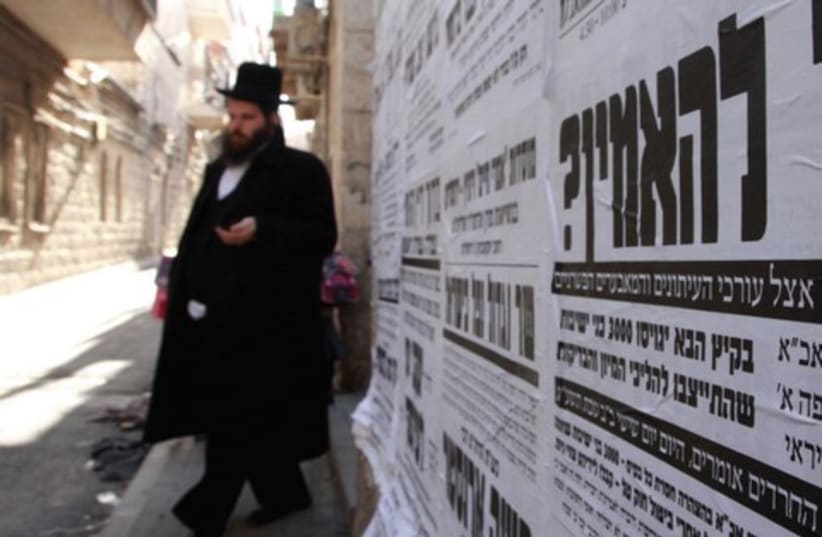A few weeks ago there was a demonstration in Mea She’arim which turned violent, with stone throwing, torching of garbage containers, attacks on passing cars and confrontations with police.The demonstration was a protest against the fact that the Sanhedrin cemetery is closed at night, thus preventing people from coming to pray at the grave of Rabbi Ovadia Yosef at those late hours. Forget the fact that such violence hardly brings honor to the memory of Rabbi Yosef. The more important matter is the way in which visiting the grave of revered rabbis has become such a central feature of Jewish life. What does this indicate about the way in which these rabbis have come to be regarded? Admittedly this is not a totally new phenomenon. In Morocco, it was customary to visit the graves of rabbis who were considered to have miraculous powers. In Hassidic circles in Europe, visits to the grave of the Tzadik was also important. The grave of the late Lubavitcher rebbe in Brooklyn has become a center of mass visitation, prayer and petition. At least no one here has yet suggested that Rabbi Yosef was the messiah.All of this is part of the general tendency to elevate rabbis above the status of normal human beings. This elevation occurs not only after they have gone to their eternal reward, but also while they are still alive. Among Ashkenazim, it used to be common only in Hassidic circles, but it has spread far beyond that. To my mind, this is a dangerous aberration which has been introduced into Judaism distorting the purpose of the rabbinate and ascribing superhuman powers to rabbis and sages. It does not belong here.
One only has to read the last chapter of Deuteronomy in which Moses’ death and burial are described. He was buried by God “in the valley in the land of Moab, near Beth-peor; and no one knows his burial place to this day” (34:6). It would have been possible to take his body into the Land of Israel they were about to invade and bury it there. It seems obvious that God deliberately wanted Moses’ grave to be unknown. Moses was the greatest of the prophets, one who knew God face to face, and that may have been the very problem. His grave could have become a place of worship and Moses’ could have been elevated above human status. There is a very fine line between honoring such a person and lauding him to the point where it becomes idolatry.Some rabbis should be respected. Others not. It all depends on their deeds and on what they teach. We have all seen rabbis, some in high positions, whose conduct in business or personal affairs was totally improper. They deserve no respect. But even the best, most honest and most learned rabbi is still just a human being and all human beings have faults. Neither the Torah nor the ancient Sages hesitated to fault Moses and other important figures when they were wrong. Remember that Moses died without getting to the land of Israel as a punishment for his act of desecrating God; “ …by failing to uphold My sanctity among the Israelite people” (Deut.32:51). Rabbis are people and people are imperfect. None of them deserve to be treated as angels or deities. None of them is above criticism. Today, we have rabbis who claim all kinds of powers and have gathered cults around them. All of these phenomenon are distracting us from the true role of the rabbi. The rabbi is not a prophet, not a seer, not a magician, not a financial advisor, not a miracle worker. The rabbi is one who knows the Jewish tradition well and who can interpret it and can guide one in matters of Jewish law and observance.The Torah tells the story of the brazen serpent that Moses made at God’s command in order to heal those bitten by a serpent (Numbers 21:7-9). Centuries later the pious king Hezekiah destroyed it because it was becoming an object of idolatry. “He also broke into pieces the bronze serpent that Moses had made, for until that time the Israelites had been offering sacrifices to it...He trusted only in the Lord God of Israel... ” (2 Kings 18:4-5). Any object that becomes an idol and takes away from the pure worship of God has to be removed.That applies to the phenomenon of the elevation of rabbis as objects of worship, certainly of those who are unworthy, but even of those who are themselves pious and learned. Placing them on pedestals is a dangerous act that endangers Judaism and can no longer be tolerated. The writer, former president of the International Rabbinical Assembly, is a twotime winner of the National Book Award. His latest book is The Torah Revolution (Jewish Lights).Tradition today: Honoring rabbis, but not worshiping them
A few weeks ago there was a demonstration in Mea She’arim which turned violent, with stone throwing, torching of garbage containers, attacks on passing cars and confrontations with police.
